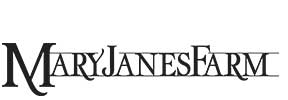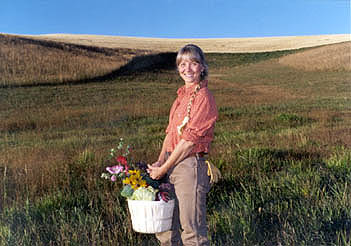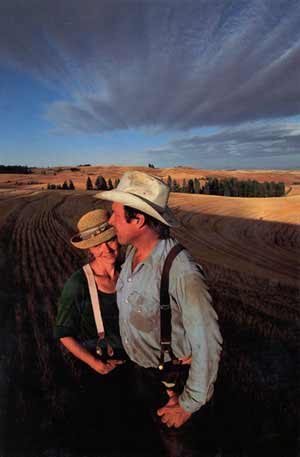|
Woman Turned Family Farm Into Organic Business
All she wanted was elegant, organic vegetarian meals to prepare instantly at home. And when she couldn't find any, she made them herself. Now, Mary Jane Butters has a business based at her Idaho farm producing 60 packaged prepared foods pure enough to be labeled organic and tasty enough to satisfy the most refined palate. MaryJane was born and raised in Ogden, Utah, in the small house where her parents, Allen and Helen Butters, still live today. "It seems that everything we did involved food," she said. "We had a large garden, meticulously free of weeds. We had every kind of fruit tree plus lots of raspberries, currants, chokecherries and strawberries. We ran our squash vines up the fruit trees, and spent our summers sleeping in a pup tent in the garden next to our chicken coop, pigeon roost, and duck house." Every year, the family preserved a basement full of food. Her father grew up on a farm, but spent his entire adult life working in a factory that made cans. Consequently, he brought home thousands of empty cans to fill with garden produce. In the cool of the basement, her parents and their five children all took turns cranking the manual can sealer. After graduating from high school in 1971, MaryJane started working as a secretary, but quit a few months later to pursue a job more appealing to her pioneering spirit: watching for fires from a mountaintop lookout near Weippe, Idaho. Butters continued to select jobs where she was the first of her gender: the only woman on the carpentry crew at Hill Air Force Base, the first woman wilderness ranger hired by the US Forest Service, and in 1976, the first woman station guard at the Moose Creek Ranger Station, the most remote Forest Service district in the continental US, in Idaho's Selway-Bitterroot Wilderness Area. After two years, she left Moose Creek with her husband John to find a farm of their own and start their own family. Their daughter, Megan, was born in 1979, and their son, Emil, was born four years later. Finding that farm took a little longer. "I envisioned an old farm in northern Idaho hidden at the end of a dirt road. I dreamed of chicken coops, barns, root cellars, fruit trees in bloom, clematis vines, lilacs, wild roses, irises, and gardens," she recalled. "Then in 1986, I saw an ad for a five-acre homestead. It sounded perfect, so I called and bought it sight-unseen. I named it Paradise Farm, since it was hidden at the base of Paradise Ridge, 8 miles from Moscow, Idaho." Her world seemed idyllic, but changes were coming. John left as their marriage ended in divorce, and then in May of 1986, the Pacific Northwest was dosed with releases from the nuclear accident at Chernobyl. "I got mad. Motherhood brought out a special activism in me." MaryJane called a public meeting to discuss the threat of nuclear radiation exposure, specifically from the Hanford nuclear facility in nearby eastern Washington. More than 35 people showed up and elected MaryJane president of their new organization, Palouse-Clearwater Hanford Watch. "It was an intoxicating era, so exciting," she said. "We got involved in lots of water quality, transportation and agricultural issues. But for me it ended at a protest meeting about agricultural spraying in 1989, when I realized that I just did not believe in making change by confronting people in that way." At that same meeting, MaryJane met a farmer who grew a small hard-skinned variety of garbanzo bean known as desi. The desi beans were an ideal organic crop for the region, since the plants did not need insecticide applications. However, the unusual beans were also of little agricultural value, since there was no established market for them. "I decided not to be a righteous environmentalist, but to reach across to the farmer. I wanted to design a product that would create a market for that bean," she said. "I experimented with creating falafel, a mid-eastern staple, but relatively unknown food in this country at that time. My kids liked it, but we joked about eating 'Mom's awful falafel.' By 1990, I started marketing it locally." In 1993, her business was incorporated as Paradise Farm Organics, Inc. "I became interested in working with farmers instead of just blaming them. I realized that if I want the farmers here to grow organic, I need to help them make that transition." Experimenting, MaryJane ultimately created 60 dried ready-to-eat foods using organic ingredients.
During the same time, MaryJane found a partner to share both her business and her life. "Over the years as I lived here at Paradise Farm, I occasionally caught the brilliant smile and helping hand of my neighbor, Nick Ogle. Nick's 600-acre farm borders mine on two sides. He and his parents still work the ground Nick grew up on. Nick loves flowers. The Paradise Ridge wildflower bouquets he brings me are no longer anonymously left upon my doorstep. In 1993, Nick became my husband." MaryJane is the company's president, and Nick is in charge of the production facilities. And together they direct the growing of organic herbs, produce and grains at their farm. Their union was immortalized in the National Geographic magazine with a photo that fills page 89 of the December 1995 issue. The easy-to-prepare, tasty, and organic foods MaryJane offers through her website maryjanesfarm.org are what she dreamed of making decades earlier when she first started feeding her own children. "This is what I wanted years ago for my family: organic dried foods that are both elegant and easy." Bill London is a freelance writer living in Moscow, Idaho, with his partner of 29 years, Gina Gormley. He is the author of four books, plus magazine and newspaper articles. He has known MaryJane Butters for more than a decade and supports her mission of remaking agriculture - and loves to eat those delicious meals she's created. |




